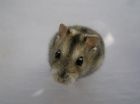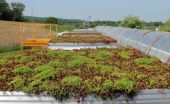(Press-News.org) Vancouver, BC - Today the International Cooperation to Sequence the Atlantic Salmon Genome (ICSASG) announced completion of a fully mapped and openly accessible salmon genome. This reference genome will provide crucial information to fish managers to improve the production and sustainability of aquaculture operations, and address challenges around conservation of wild stocks, preservation of at-risk fish populations and environmental sustainability. This breakthrough was announced at the International Conference on Integrative Salmonid Biology (ICISB) being held in Vancouver this week.
Salmonids are an important piece of the economic and social fabric of communities on BC's coastline and many other countries including Norway and Chile. The fisheries and aquaculture sector is one of the economic engines of BC: seafood is the province's largest agri-food export, contributing $870 million of the province's total agri-food exports of $2.5 billion. High value species such as salmon make a significant economic contribution to the economy. Canada's Atlantic salmon related aquaculture revenues exceed $600 million annually and BC is the only province with a commercial salmon fishery.
Salmonids are also a key species for research and while some salmon genetic information is known, many fundamental questions have remained: a fully assembled reference sequence available for researchers worldwide will have a major impact on revealing information about salmon and other salmonids, such as rainbow trout and Pacific salmon.
Viruses and pathogens are a challenging hazard to livelihoods and economies dependent on salmon and this sequence provides real support to improve the production of salmonids in a sustainable way. Other benefits of the salmon sequence include applications for food security and traceability and broodstock selection for commercially important traits. Healthier food, more environmentally sound fish farming and better interactions with wild salmon are all positive outcomes from this research.
"Knowledge of the whole genome makes it possible to see how genes interact with each other, and examine the exact gene that governs a certain trait such as resistance against a particular disease," says Dr. Steinar Bergseth, Chair of the International Steering Committee for the ICSASG. "The development of vaccines and targeted treatment is much closer."
The international collaboration involves researchers, funding bodies and industry from Canada, Chile and Norway. The successful completion of the salmon genome provides a basis for continued partnerships between these and other countries involved in research and industrial development of salmonids.
"A better scientific understanding of this species and its genome is a critical step towards improving the growth and management of global fisheries and aquaculture," says Dr. Alan Winter, President & CEO of Genome BC. "Additionally, the level of international collaboration seen in this project is a testament to the importance of global coordination to address challenges too big for any one country individually."
The aquaculture industries need to produce healthy food in a sustainable and efficient manner to be in line with the consumer demands. "The knowledge of the sequence will certainly give us a long awaited tool to achieve this" says Petter Arnesen, Breeding Director of Marine Harvest, Norway.
INFORMATION:
About Genome British Columbia
Genome British Columbia is a catalyst for the life sciences cluster on Canada's West Coast, and manages a cumulative portfolio of over $660M in 211 research projects and science and technology platforms. Working with governments, academia and industry across sectors such as forestry, fisheries, agriculture, environment, bioenergy, mining and human health, the goal of the organization is to generate social and economic benefits for British Columbia and Canada. Genome BC is supported by the Province of British Columbia, the Government of Canada through Genome Canada and Western Economic Diversification Canada and more than 300 international public and private co-funding partners. http://www.genomebc.ca
The Chilean Economic Development Agency is an autonomous agency of the Chilean State with legal capacity and equity. The agency is responsible for promoting the economic development of Chile, competitiveness and investment for production modernization.
InnovaChile Committee is a committee of the Chilean Economic Development Agency. This Committee works to raise the competitiveness of the Chilean economy by increasing the number of companies in Chile which integrate innovation in their competitive strategies.
The Research Council of Norway is Norway's official body for the development and implementation of national research strategies. The Council is responsible for enhancing Norway's knowledge base, and for promoting basic and applied research and innovation in order to help meet academic and industrial needs within Norway and to encourage international research and cooperation.
The Norwegian Fishery and Aquaculture Industry Research Fund is a funding program for industrial research and development work within fisheries and aquaculture and is based on a levy of 0.3% on all exported fish and fish products from Norway.
Contact:
Jennifer Boon
Communications Specialist, Genome BC
Phone: 778-327-8374
Email: jboon@genomebc.ca
BACKGROUNDER
Worldwide, commercial salmon production exceeds one billion pounds annually, with about 70% coming from aquaculture salmon farms. In addition to being an important economic resource, salmon and other salmonid species such as trout are considered "sentinel species" for monitoring the waters, and are important markers for ecotoxicology studies.
The International Cooperation to Sequence the Atlantic Salmon Genome (ICSASG) was formed in 2009 as a partnership between Genome BC, the Chilean Economic Development Agency, InnovaChile, the Norwegian Research Council, and the Norwegian Fishery and Aquaculture Industry Research Fund.
The ICSASG brings together expert biologists who have studied salmonids with commercial and government agencies interested in funding further research.
The genome sequence identifies and maps the genes in the Atlantic salmon genome: a well-annotated salmon genome will directly benefit the world's fisheries and aquaculture industries.
This genome acts as a reference/guide sequence for the genomes of other salmonids such as Pacific salmon, rainbow trout and more distantly related fish such as smelt and pike.
Unlike the human and mouse genome sequencing projects, the Atlantic salmon genome sequence will not be considered a "finished" sequence.
The quality of the Atlantic salmon sequence will be critical as it must be sufficient to support detailed analyses, such as comparisons of duplicated regions within the genome and comparative genomics involving other fish species.
Scientific breakthrough: International collaboration has sequenced salmon genome
2014-06-10
ELSE PRESS RELEASES FROM THIS DATE:
Summertime cholesterol consumption key for wintertime survival for Siberian hamsters
2014-06-10
Increasingly, scientific findings indicate that an organism's diet affects more than just general health and body condition. In an article published in a forthcoming issue of the journal Physiological and Biochemical Zoology, researchers from Nicolaus Copernicus University have found evidence that the diet of some animals must include cholesterol in order for them to enter necessary periods of energy conservation known as torpor.
Torpor is a temporary, strategic decrease of body temperature and metabolic, heart, and respiration rates that can enable an organism to survive ...
RHM announces publication latest issue: Population, environment & sustainable development
2014-06-10
London, June 10, 2014 – Papers published in the latest themed issue of Reproductive Health Matters demonstrate the extent of evidence and progressive thinking around population dynamics and sustainability that is informing development policies and programs. The theme of this issue is timely given that meetings and negotiations are currently taking place around the world to decide what will be included in the post-2015 development goals.
The discussions about the post-2015 agenda have focused on calling out to sexual and reproductive health and rights (SRHR) advocates ...
Male dwarf spiders make sure offspring is their own
2014-06-10
Chastity belts were not first thought out in mediaeval times – members of many animal groups have evolved similar mechanical safeguards to ensure their paternity. Male dwarf spiders, for instance, use mating plugs to block off the genital tract of the female they have just mated with. The larger and older the plug, the better the chances are that other males will not make deposits in a female's sperm storage organ, too. So says Katrin Kunz and co-authors of the Zoological Institute and Museum in Greifswald, Germany, in an article published in Springer's journal Behavioral ...
Signpost for health services: Teenagers go from school psychologist to family doctor
2014-06-10
After initially visiting a school psychologist, adolescents in the United States with a mental disorder often go to seek care from their pediatricians or family doctors. Fewer of them continue their treatment directly with a psychotherapist or doctor specialized in mental disorders. This shows an analysis conducted by scientists at the University of Basel that has just been published in the academic journal PLOS ONE. The results are based on a nationally representative cohort of 6,500 U.S. teenagers.
A considerable number of children and adolescents suffer from a mental ...
ESMO survey sheds light on common clinical practice for incompletely resected lung cancer
2014-06-10
VIDEO:
R.Califano explains why ESMO Young Oncologists launched a survey on common clinical practice for incompletely resected lung cancer and analyses interesting results claiming for more adherence to guidelines and more...
Click here for more information.
Lugano, Switzerland, 10 June 2014 -- A landmark survey of more than 700 specialists provides crucial real-world insight into the treatments most oncologists choose for lung cancer patients whose tumour has been incompletely ...
Game changer for leukemia therapy
2014-06-10
Australian researchers are zeroing in on a promising new approach to killing off cancer cells in patients with leukemia.
In a study led by the South Australian Health and Medical Research Institute (SAHMRI) and the University of Adelaide's Centre for Personalised Cancer Medicine, researchers have found that cancer cells decide whether to live or die after a short period of intense exposure to targeted therapy, opposing the current requirement for continuous treatment.
The researchers say this study presents a new treatment strategy which will translate to a significant ...
Women appear in only 5 percent of sports newsprint
2014-06-10
This news release is available in Spanish.
Women are the subject of news in sports papers in only 5.11% of the cases, sometimes alone (2.18%) and others accompanied by men (2.93%). On the other hand, men are the focus of this kind of information in 92.2% of the cases, according to a study presented recently by UC3M professor Clara Sainz de Baranda at the II International Conference on Gender and Communication. "The remaining 5% is neutral information, which is why, in these kinds of topics, like soccer balls, fields, field houses and goals, men appear more often ...
New teaching approach touted for engineering education
2014-06-10
WEST LAFAYETTE, Ind. – Purdue University researchers who developed a new approach to more effectively teach large numbers of engineering students are recommending that the approach be considered for adoption by universities globally.
The system, called the Purdue Mechanics Freeform Classroom, allows students to interact with each other and faculty online while accessing hundreds of instructional videos and animations. It was pioneered by Charles Krousgrill, a professor of mechanical engineering, and has been used for more than two years in two mechanical engineering core ...
Virginia Tech architect reveals 'green roofs' need not go to great depths to work
2014-06-10
Hot town, summer in the city — it's nothing new, but ways to handle the heat, humidity, and stormwater haven't changed much since the invention of the sewer system.
One solution offered by architectural researchers is known as a "green roof" — a roof covered in living, growing plants to soften the effects of heat, flooding, noise, and stormwater runoff.
Elizabeth J. Grant, an assistant professor of architecture and design at Virginia Tech, will present ways for architects to determine the most effective depths of green roofing for stormwater control on Thursday at the ...
Scientific breakthrough: International collaboration has sequence salmon genome
2014-06-10
Vancouver, BC - Today the International Cooperation to Sequence the Atlantic Salmon Genome (ICSASG) announced completion of a fully mapped and openly accessible salmon genome. This reference genome will provide crucial information to fish managers to improve the production and sustainability of aquaculture operations, and address challenges around conservation of wild stocks, preservation of at-risk fish populations and environmental sustainability. This breakthrough was announced at the International Conference on Integrative Salmonid Biology (ICISB) being held in Vancouver ...




